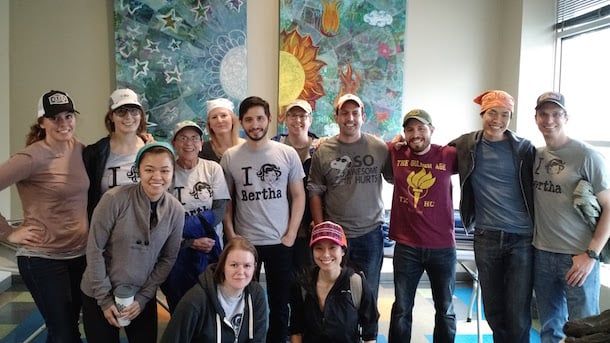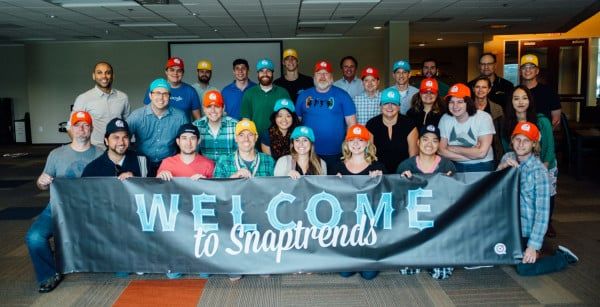
Life would be so much easier if we knew what was on the path ahead of us, right?
These six Austin founders share what they wish they would've known before launching and leading a company, reflecting on some of the challenges they've faced and weighing in on if it ever gets simpler.

Alfredo Ramirez, CEO and co-founder
Launched in 2007, Vyopta provides data analytics solutions to large enterprises to improve video and web collaboration.
What are the top three things you wish you had known beforehand?
 1. I wish I had known about the importance and value of inbound marketing.
1. I wish I had known about the importance and value of inbound marketing.3. Building a great B2B software product requires discipline and creativity. Business users use fun, useful, and beautiful consumer software and now they are looking for that same experience with tools that help them do their jobs.
What has been the biggest challenge since launch?
The biggest challenge is to deliver a simple enterprise video/UC monitoring/analytics solution that IT users can evaluate, purchase and deploy on their own with minimal support from Vyopta.
Has it gotten easier?
2. It is hard at a growing company to get the balance right — making sure we have great team members who are ready to give 100 percent, while also ensuring they have time to refresh themselves to avoid burnout. I am proud to say we have very low turnover because that balance is really important to us. We want our team doing their best work every day, and it is vital to continually challenge the team at all levels to achieve our ambitious goals and make sure we are all growing as individuals.

Erine Gray, founder and CEO
Findhelp founded in 2010, connects people in their time of need with a universal online directory of social service organizations.
What are the top three things you wish you had known beforehand?

What has been the biggest challenge since launch?
Has it gotten easier?

John Price, CEO
Vast merges real-time personalized analytics of local market trends with massive inventory and relevant data from the automotive, real estate and travel industries to support consumers. The company started in 2001, and Price joined as CEO in 2010.
What are the top three things you wish you had known beforehand?

1. Really understanding what "focus" means.You hear people say it all of the time, but you don't really know. When you start a company, you start thinking of how to chase revenue, but revenue is the enemy of focus. What I’ve learned is that it doesn’t mean only focusing and doing one thing, it means focusing your key resources on the key item that you are betting on is going to matter.
2. Learn the dynamics of a board's role and what each board member cares individually about. It doesn’t make the boards bad, they’re just different companies with their own investment funds and firms. I actually went into this job believing that somehow I had a new team with the board. That’s not true.
3. You don’t know anything abut commercial real estate, and it is going to be one of your biggest problems. You’ll need space from day one to the end. The way we see how space works is completely contrary to what you need in a growing, shrinking startup.
What has been the biggest challenge since launch?
It’s a constant struggle between focusing on growth versus focusing on profitability. It's a balancing act, and most CEOs live in the middle of the extreme profit side or the extreme growth side.
Has it gotten easier?
No. it hasn’t gotten it easier, but it’s gotten more fun. It's one of those things that the stuff that used to stress me out just makes me laugh now. I can tell when things aren't going to go well, but I can laugh because I know what it is. It hasn’t gotten easier because as you grow, you haven’t seen things before and the market changes. Every six to 18 months the entire landscape of the market changes.
You're always fearful. Every CEO has read "The Innovator's Dilemma" by Clayton Christensen. One day, you can literally be the market leader, and tomorrow, a six-person startup can put you out of business.
Tech is the only industry that ever existed like that. It’s unique. You either are going to stay at the bleeding edge, or you’re going to die. It never gets easier. It only gets easier if you’re signing up for your eventual demise. But it does get more fun.

Eric Klasson, CEO and co-founder
In 2012, Snaptrends joined the Austin tech community to help organizations of all industries leverage social media conversations and posts whenever and wherever they occur to inform decision making and use in strategy building.
What are the top three things you wish you had known beforehand?
 1. Coming from a large corporate setting, the ability to have a tangible impact on the culture of the company as a whole is limited. When you found and grow a company, every hire matters and can strongly influence the company’s success and culture, so it’s important to invest in the right people. Snaptrends has built a workforce of happy and talented employees.
1. Coming from a large corporate setting, the ability to have a tangible impact on the culture of the company as a whole is limited. When you found and grow a company, every hire matters and can strongly influence the company’s success and culture, so it’s important to invest in the right people. Snaptrends has built a workforce of happy and talented employees.
What has been the biggest challenge since launch?
The biggest challenge we face is the fact that social media is relevant to every organization worldwide. The global market for social media insight solutions is billions of dollars. Due to the variety of organizations we cater to building data feeds, visualizations and predictive insights that address diverse client needs is a balancing act. Our success is all about finding equilibrium between the future of the product that we envision and diverse customer requirements. It’s a challenge we embrace and have navigated successfully.
Has it gotten easier?
The job has gotten easier, primarily because of my strong leadership and investor team. We are fortunate to have one of the top engineering teams in the U.S., and our sales and marketing group is the best I have ever worked with in my career. Pulling it all together is our People Operations leader that is a local rock star. And our investors are experienced technology executives that totally get software and advise me on a regular basis. Also, when you truly love what you do, it makes coming to work each day a pleasure.

Madison Wickham, founder and CEO
Grandex owns and operates a catalogue of media and commerce platforms including Total Frat Move, Total Sorority Move, Post Grad Problems, Rowdy Gentleman, Lady Clothing, and Man Outfitters. The company launched in 2010.
What are the top three things you wish you had known beforehand?
 1. A better understanding of business finance
1. A better understanding of business finance
What has been the biggest challenge since launch?
Has it gotten easier?

Gard Mayer, VP of sales and founder
Founded in 2006, Invodo builds data-driven video programs to help retailers sell, brands deliver product value and consumers shop.
What are the top three things you wish you had known beforehand?
1. If you are going to start a company with  other people make sure you really know your partners. Starting a company is like getting married. It can be beautiful if everything works as planned, but it can get really ugly if it doesn't. You need to know how your partners will act in stressful situations? Are they accountable? Can they be trusted? Do you share the same values? Do you actually like them and most of all do you like hanging out with them because you're going to have to spend a lot of time together.
other people make sure you really know your partners. Starting a company is like getting married. It can be beautiful if everything works as planned, but it can get really ugly if it doesn't. You need to know how your partners will act in stressful situations? Are they accountable? Can they be trusted? Do you share the same values? Do you actually like them and most of all do you like hanging out with them because you're going to have to spend a lot of time together.
What has been the biggest challenge since launch?
Looking back 10 years ago, I never would have predicted how hard it would be to manage growth and the inevitable cultural changes that occur. It's so important to establish a culture that can evolve as you grow, but still maintain the core tenants (or soul) of the original founder's vision.
Has it gotten easier?
Has it gotten any easier to create a great culture that can withstand the changes that occur with growth or contraction? Well, I'd say our company had to make a major pivot which was very difficult and very painful, but ultimately the right thing to do in order to create a great culture again. It started with the introduction of a new CEO who made it very clear by his actions that he was putting our employees (our family really) above all other priorities. He also made some difficult decisions around our product offerings and changed the company's focus from being a hybrid technology services company to an agency model that was focused on creating product content in the form of videos and 3D. With that change, we had to re-org and let some very dear friends go in the process, but it was done with empathy and caring and I think everyone understood that it was what had to happen. In the end, it seems that we made the right moves for the company and for the culture. We have a very clear direction as a company, our employees have very clear goals and everyone knows how they contribute to Invodo's success. It wasn't easy but we are definitely on the right track.



